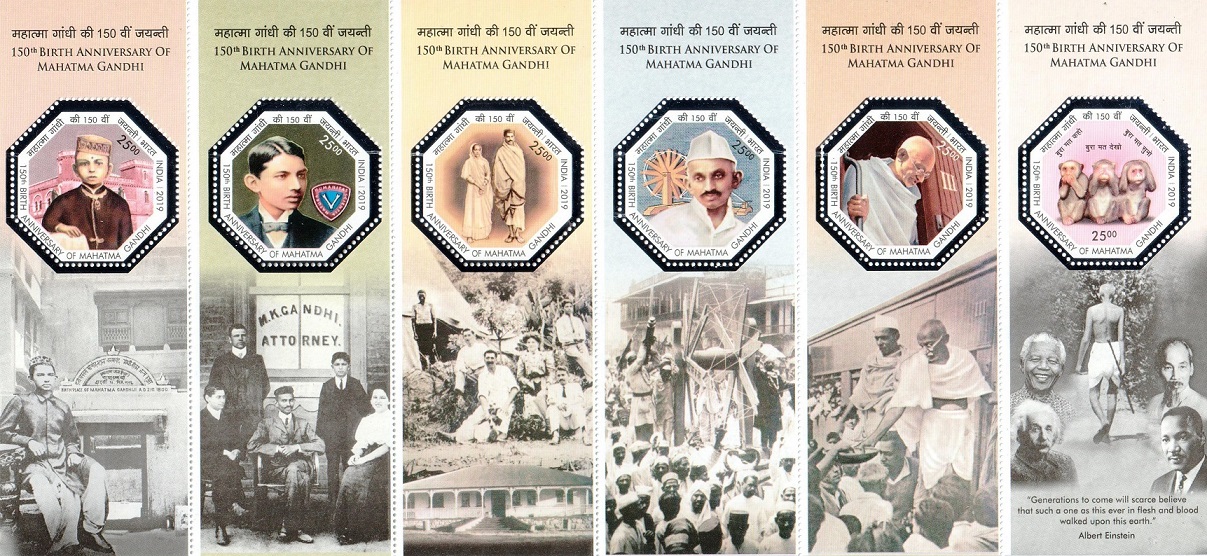
India on Mahatma Gandhi 2019
Complete set of 6 nos. of commemorative Hexagonal postage stamps on 150th Birth Anniversary of Mahatma Gandhi :
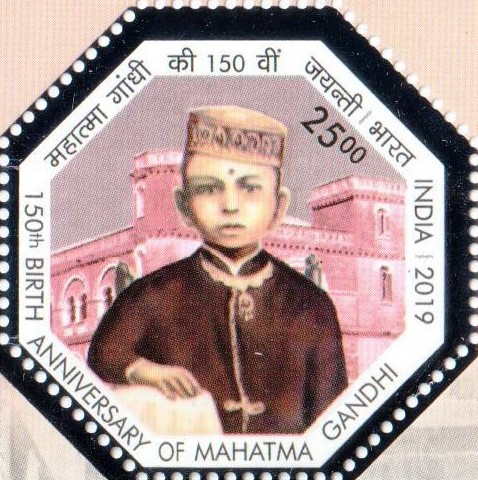
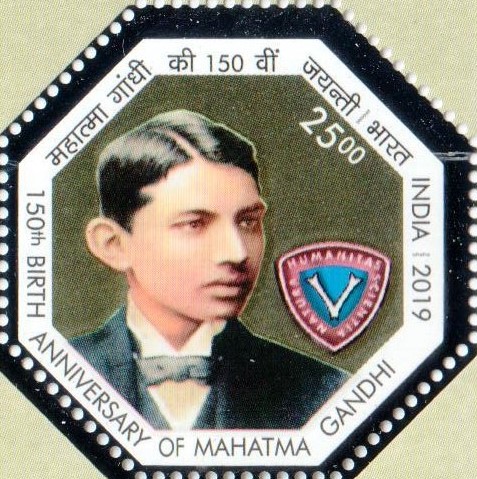
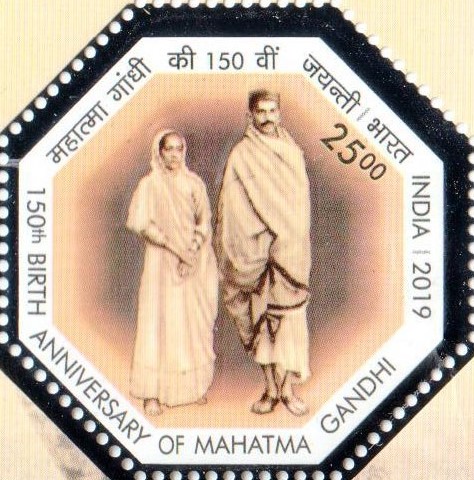
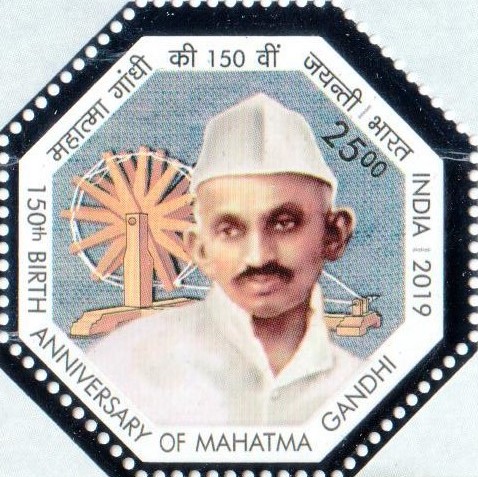
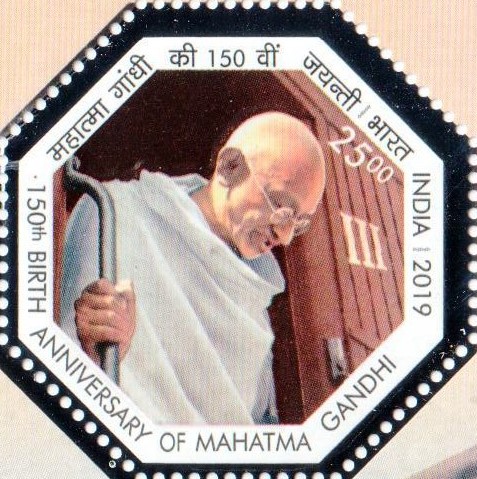
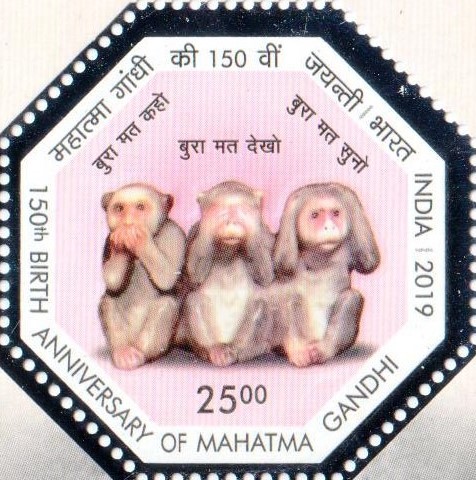
 Issued by India
Issued by India
Issued on Oct 2, 2019
Issued for : Department of Posts is honoured to release a set of six Commemorative Postage Stamps to mark the historic occasion of the 150th Birth Anniversary of Mahatma Gandhi.
Credits :
Stamp/Brochure/Cancellation Cachet : Sh. Sankha Samanta
FDC : Based on the design received from Department of Drinking Water and Sanitation, Ministry of Jal Shakti.
Type : Miniature Sheet, Mint Condition
Colour : Multi Colour
Denomination : 2500 Paise (6)
Stamps Printed : 800000 each
Miniature Sheets Printed : 2.0 Lakh
Printing Process : Wet Offset
Printer : Security Printing Press, Hyderabad
Name : Mohandas Karamchand Gandhi
Born on 2 Oct, 1869 at Porbandar, Gujarat, India
Died on 30 Jan, 1948 at New Delhi, India
About :
- 2nd October, 1869 is a red-letter day in the history of India, as Mohandas Karamchand Gandhi was born on this day into a Modh Baniya family as the last child of his parents, Karamchand and Putlibai, at Porbandar. The Indian classics, especially the stories of Shravana and King Harishchandra had a great impact on him. The virtues of penance, patience and discipline were passed onto Gandhi by his mother. In May 1883, Mohandas was married to Kasturbai Makhanji Kapadia in an arranged marriage, according to local customs. The Gandhi couple had four children, all sons. In November 1887, the 18-year old Gandhi graduated from high school in Ahmedabad. The next year, he enrolled at Samaldas College in Bhavnagar State, then the sole degree-granting institution of higher education in the region. However, he dropped out and returned to his family in Porbandar.
- Gandhi was keen to study Law at London. After much persuasion, his mother finally let him go, only after he made a vow of abstinence from meat, alcohol and women. In 1888, Gandhi sailed to England and attended University College, London (UCL) which is a constituent college of University of London. At UCL, he studied law and jurisprudence and was invited to enroll at Inner Temple with the intention of becoming a barrister. His time in London was influenced by the vow he had made to his mother. He became an active member of the London Vegetarian Society.
- Gandhi was called to the Bar in June 1891 and then left London for India. His attempts at establishing a law practice in Bombay failed. In 1893, a Muslim merchant in Kathiawar offered him a lawyer’s assignment in South Africa.
- Gandhi arrived in South Africa in 1893 where he spent 21 years and developed his political views, ethics and politics. Gandhi faced discrimination because of his skin colour. He was not allowed to sit with European passengers in the stagecoach; he was thrown off a train at Pietermaritzburg after refusing to leave the first-class. The Abdullah case that had brought him to South Africa concluded in May 1894. However, he decided to stay on and helped found the Natal Indian Congress in 1894 and through this organisation, he moulded the Indian community of South Africa into a unified political force. In 1906, the Transvaal government promulgated a new Act compelling registration of the colony’s Indian and Chinese populations. At a mass protest meeting held in Johannesburg on 11th September that year, Gandhi adopted his still evolving methodology of Satyagraha (devotion to the truth) or nonviolent protest, for the first time.
- At the request of Gopal Krishna Gokhale, he returned to India in 1915 and brought an international reputation as a leading Indian nationalist, theorist and community organizer.
- In India, he soon joined the Indian National Congress. Gandhi’s first major achievement came in 1917 with the Champaran agitation in Bihar. The peasantry was forced to grow Indigo, a cash crop whose demand had been declining over two decades and was forced to sell their crops to the planters at a fixed price. Pursuing a strategy of nonviolent protest, Gandhi took the administration by surprise and won concessions from the authorities. In 1918, Kheda was hit by floods and famine and the peasantry was demanding relief from taxes. Gandhi initiated a signature campaign where peasants pledged non-payment of revenue even under the threat of confiscation of land.
- In 1919, the British passed the Rowlatt Act. Gandhi opposed this vehemently. Satyagraha followed, with people assembling to protest. On 30 March, 1919, British law officers opened fire on an assembly of unarmed people, peacefully gathered, participating in satyagraha in Delhi. People rioted in retaliation. Later Gandhi too was arrested. This along with the Jallianwala Bagh massacre, aroused mass public anger against the British Raj.
- Gandhi took leadership of the Congress in 1920 and began escalating demands. On 31 December, 1929, the flag of India was unfurled at Lahore. Gandhi-led Congress celebrated 26 January, 1930 as India’s Independence Day in Lahore.
- Gandhi then launched the salt Satyagraha in March 1930 and undertook the famous Salt March to Dandi from 12 March to 6 April, where, together with 78 volunteers, he marched 388 kilometres from Ahmedabad to Dandi, Gujarat to make salt himself, with the declared intention of breaking the salt law.
- In the late 1930s, Gandhi and the Congress withdrew their support of the Raj when the Viceroy declared war on Germany in September 1939 without consultation. Tensions escalated until Gandhi demanded immediate independence in 1942 with the Quit India movement. The British responded by imprisoning him and tens of thousands of Congress leaders. Meanwhile, the Muslim League co-operated with Britain and demanded a totally separate Muslim state of Pakistan. In August, 1947 the British partitioned the land with India and Pakistan each achieving independence on terms totally against the wishes of Gandhi and many other leaders.
- Mahatma Gandhi was assassinated the next year by Nathuram Godse. His funeral procession was attended by over 2 million people.
- Gandhi’s invaluable legacy, besides his contribution to the National movement, was the upliftment of the lower castes that led to the banning of ‘untouchability’ in the Indian Constitution. Three wise Monkeys representing the principles “see no evil, hear no evil, speak no evil” epitomize Gandhian principles of truth and non-violence. According to him, if good speech and action are practised, hatred and violence shall vanish leading to a more peaceful world. The Swadeshi movement of the 1920s and 30s resulted in Indians taking pride in their own goods and Khadi emerging as the national fabric of India. And Gandhi set an example to other world leaders such as Martin Luther King Jr., Nelson Mandela and Aung San Suu Kyi who drew motivation from his principles and strategies of non-violent transformation. “Be the change you wish to see in the world”, this sums up Gandhi’s legacy.
- Swachh Bharat Mission was launched by Hon’ble Prime Minister Shri Narendra Modi on 2nd October, 2014 with the aim of achieving an open defecation free (ODF) India by 2nd October, 2019 as a befitting tribute to Mahatma Gandhi on his 150th Birth Anniversary. Since October 2014, the rural sanitation coverage has increased from 38.7% to over 99%, over 10 crore toilets have been built and over 599963 villages, 699 districts and 35 States/UTs have been declared open defecation free (ODF). The programme has brought about massive behaviour change and strengthened implementation and delivered mechanisms down to the Gram Panchayat (GP) level.
- The design of the First Day Cover recognizes the success of the Swachh Bharat Mission as also the relentless efforts of the foot soldiers who have contributed to achieving Mahatma Gandhi’s ideal of sanitation.
- Text : Sh. Pallab Bose.


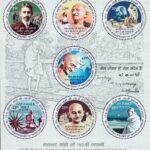
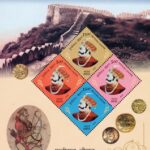
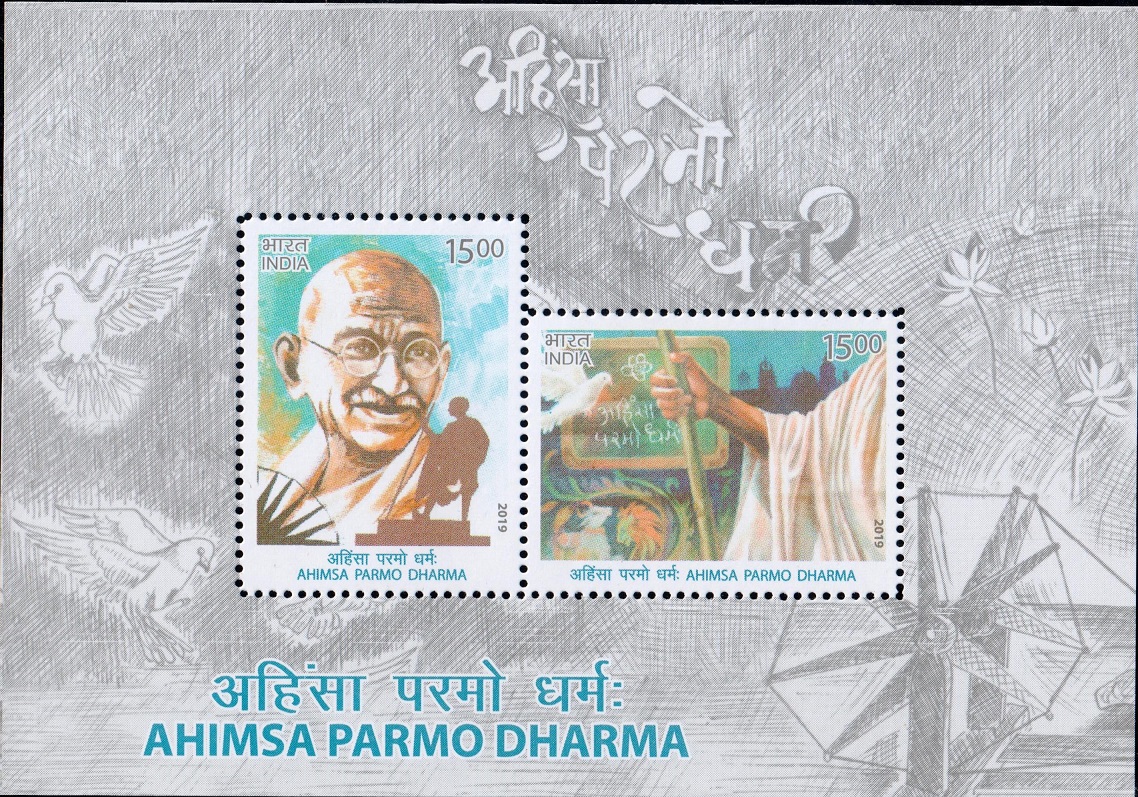
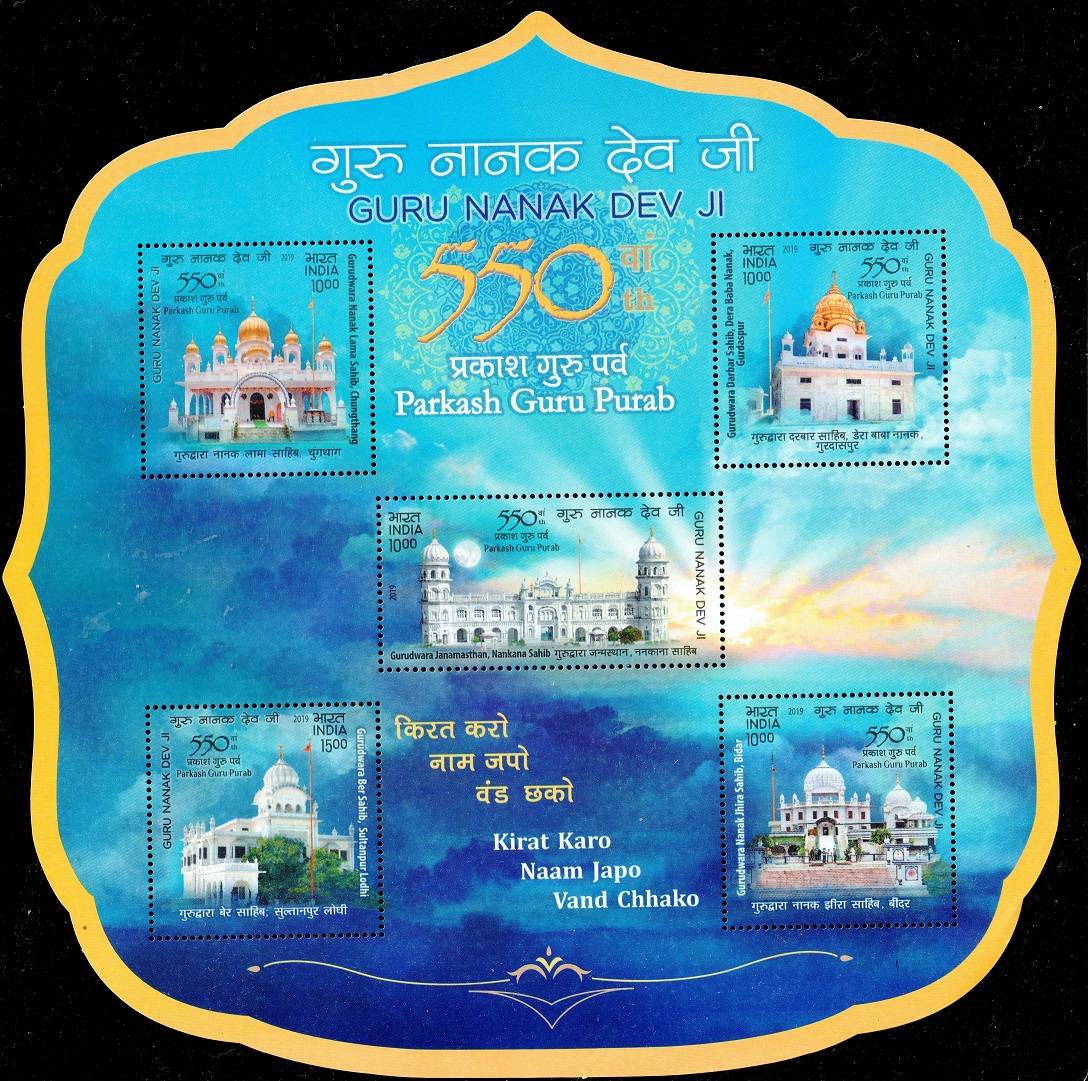

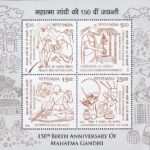
[…] the occasion of the 150th birth anniversary of Mahatma Gandhi, on 2nd October 2019, the Luxembourg Post & Telecommunications in cooperation […]
[…] February, 2020. A Definitive stamp was released by it on 2nd October, 2019 on the occasion of the 150th birth anniversary of Mahatma Gandhi and a stamp on Diwali, the festival of lights, on 19th October, 2018. India Post […]
[…] of the struggle for India’s freedom Shri Manoharbhai Patel came in contact with stalwarts like Mahatma Gandhi, Pt. Jawahar Lal Nehru, Shri Vallabh Bhai Patel, Shri Jaiprakash Narayan and others, he also came […]
[…] easily express her creativity. But there was one more reason for using the fabric, espoused by Mahatma Gandhi, by the then fledgling designer. Ritu was appointed as an advisor to […]
[…] Bagh massacre’. Kamaraj participated in the famous Vaikom Satyagraha, and, following Mahatma Gandhi’s appeal for non-cooperation, he started propaganda for khadi and […]
[…] the clarion call of the Mahatma for non co-operation with the British ruler both in 1930 and 1932, Satyamurti defied prohibitory […]